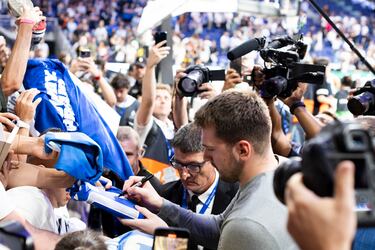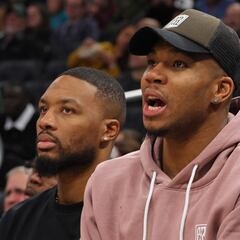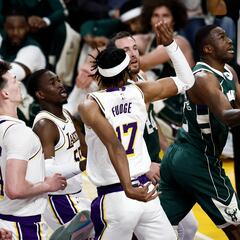Luka Doncic is facing a critical year of uncertainty with the Dallas Mavericks
The Mavs have a decisive season ahead of them, one with a lot of uncertainty. As such, Doncic must step up and be counted.

Winning isn’t easy: it never is. And, in NBA, it’s something that everybody learns sooner or later, especially the biggest stars, who, at some point in their careers, have the dream of the ring in their mind.
In the end, it’s the only way in which they can be remembered forever, otherwise the sheer number of players and great players will see their memory fade away and from then on, nobody can rescue it. As time passes the desire to win becomes a necessity: at the end of the day, there are an infinite number of amazing players who have retired, for one reason or another, who have not reaped the rewards of dedicating their whole life to basketball. In the end, a champion is forever and people forget about numbers, but never glory.
Luka Doncic finds himself in this exact moment: the champion who has never been a champion. No longer do his numbers justify his greatness, he must seal it by winning. The 2022 Conference Finals are forgotten, the Mavs didn’t work in a system that was unsustainable and the pieces have gradually fallen away as time has passed. Reality has hit Doncic hard and was set on fire by the signing of Kyrie Irving. The structural problem has not been changed, with Mark Cuban rejecting alterations, including switching out Jason Kidd who has gone from being a star in his first season to a flop in the next. With all the same pieces, who though the result was going to be different?

The context of the story is complicated: Doncic will receive $40 million this year, a figure which will rise to $50 million in 2026/27, when his contract ends. If he gets to the All Star, something he has done for four straight years, he will be eligible for an extension worth $318 million over 5 years, with $83.6 million in the final year, extraordinary numbers backed by the new collective agreement which will see him become the highest-paid player in history.
But that doesn’t mean he’s going to play for the Mavericks. In the era of ultimate player power, a situation in which he is simply left to waste is a common occurrence when results don’t go your way. Doncic is about to start his 6th season in NBA, and will be 25-years-old as of February 25 next year. He’s still young, and can go to practically any team and continue his career how he likes, and, above all, wherever he likes. If he sees it to be necessary, he could indeed force his way out of Dallas, that’s just how the modern era works.
Going even further than Doncic signing a deal which will see him earn more that Michael Jordan did in his entire career, it could be said that both sides of the divide are in a favourable position. The franchise has remained firm to its style since it was acquired by Cuban back in 2000 for $285 million: they are now worth $3 billion.
Cuban has taken the Mavs to previously unimaginable heights and has always had clear in his mind exactly what the sporting project is: betting on a long-term manager and a star around which they can build, as well as keeping up good relationships with their players. Don Nelson, Avery Johnson and Rick Carlisle have been the standout names in the side, as well as Dirk Nowitzki, who reached the stars with the team. He was the only survivor, together with Jason Terry, in the ring of 2011, five years on from losing the 2006 final. Carlisle left with a good impression and was allowed to go in the way in which he wanted, stretching his career out as long as it could go.
Great day!!! @Rangers @dallascowboys
— Dirk Nowitzki (@swish41) October 17, 2023
With Doncic, again the story is similar. Don Nelson was that coach who paved the way for Johnson, but he was finished after the 2006; in 2007 the Mavs fell shockingly in the first round of the playoffs against the We Believe Warriors, despite getting 67 wins and looking more mature. And that Warriors side, as destiny would have it, managed by Nelson himself.
Johnson had one more year, but the roster was broken and at a point in which they tried - and failed - to keep Nowitzki happy while trying to push on for glory. Carlisle came to stay and left when Doncic needed him to go in order to be happy. And that’s how it is: after 13 seasons in the same team, standing next to Erik Spoelstra and Gregg Popovich as the longest-standing active players, you get told to go in order to please an emerging talent. Player power at its finest.
Kidd’s signing was controversial and didn’t resolve anything. But the end of his stay may be precipitated in a way that is not to Cuban’s liking, with far less time on the bench than his reluctance to jettison his past glories and a feeling always tarnished with a sense of melancholy. No wonder: Kidd was key in winning the 2011 ring, the only one he managed as a player, he had a great relationship with Cuban and also with Nowitzki, whom he accompanied with his decision making, despite his age. It started with the Conference Finals, the team’s first since 2011; eliminating the Suns who came from being finalists and had their hands on the ring.
¡Adiós, Madrid! Back to Dallas ✈#MavsInMadrid // #MFFL pic.twitter.com/5aiJTOkhvw
— Dallas Mavericks (@dallasmavs) October 12, 2023
But it was all a mirage: the roster over-performed to the extreme, the legs of Reggie Bullock and Dorian Finney-Smith moved unrealistically and Doncic on his own with virtually no help only went so far. The memory of James Harden’s Rockets made the Mavs a somewhat tedious team to watch. And, along the way, Kristaps Porzingis, another of Doncic’s behind-the-scenes requests, fell by the wayside. His poor chemistry with the Latvian was well known. And Cuban took care of the rest.
Doncic arrives at the moment of truth, a key moment in his career that is not limited to just one year: it is impossible to ignore its importance. Another failure to reach the playoffs or an early elimination in the playoffs can mean that the project is seen as outdated, stagnant, and that deeper structural changes are needed, when it is so clear to see that there have not even been slight movements to move forward.
Even though the West is so open, taking a step in the right direction is not easy. With the only notable arrival of Grant Williams and with hardly any inside game, everything seems off. And the figure of Kyrie Irving is no longer a guarantee. He arrived when the team was 28-26 and along the way went Spencer Dinwiddie, Dorian Finney-Smith and, with them, much of the little defence that the Mavs had, which went 37-41 a month and a half later to the final score of 38-44... giving up the last few games with the intention of getting a top 10 pick in the draft. They got Cason Wallace, who they immediately traded to the Thunder in exchange for Dereck Lively II (2.16), one of those interior players they so desperately needed.
Kyrie and Doncic played together 16 times with a 5-11 record, a risk they took because of the need to have another star, even though this one seems to have lost its light a long time ago. The rapport between the two, despite the mutual encouragement, is something that has not shown: they need a lot of the ball, they are indifferent about defending and take a lot of shots, causing the Texan offence to become predictable.

The defence is conspicuous in its absence after losing the few specialists they had in Kyrie’s arrival. The point guard subtracts more than he adds, even though he has averaged 27.1 points per game in the last four seasons, shooting 55% from the field and 40% in three-pointers. Gone are the days when he transferred his powers to the team and, although he continues to display a talent typical of a generational player, being an extraordinarily good offensive tool, his non-sporting issues (anti-vaccine, anti-Semitic) have damaged his image. Way back in 2017, he left the Cavaliers to escape LeBron James’s shadow. And, curiously, it was under his shelter when he performed best: that triple against the Warriors in Game 7 of the Finals justifies any career, including his. But the past is nothing to live by and Kyrie has long ceased to be relevant.
And Doncic? He’s still there, putting up historic, mind-blowing, tremendous numbers. The question is whether or not that’s enough. We have already seen incredible players in the past who moved far away from the ring (Allen Iverson, Gilbert Arenas, Tracy McGrady, Carmelo Anthony...), all, surely, worse than the Slovenian, who averaged 32.4 points, 8.6 rebounds and 8 assists last season and is moving at 27.6. At the age of 24, he has a Rookie of the Year, four selections for the All Star and four selections for the Best Five. He always puts up numbers that drop him into the MVP debate, he gives highlight reels all the time, adds double-doubles and triple-doubles and leads the team in everything.
Even more, as far as numbers are concerned, than Dirk Nowitzki, with whom he shared team in his first season. It was the German’s last, someone who remains an ambassador of the Mavericks and is a cultural icon for the franchise and an eternal reference in the NBA. His career is a credit to him and his presence remains linked to that of the Texan franchise, of which he remains the face if Doncic does not write a story at least similar to that of the power forward.

Nowitzki, although it cost him, retired with the championship ring. And he always remained attached to the side, despite the fact that things did not always go well. Doncic, for the moment, has reached the Conference Finals as a high point and we will see what happens if the project stagnates. What is imperative is that he improves where he clearly can and does not end up focussing on the wrong things: his constant protests to the referees, caring about what he eats, his poor choice in the triple (he has tried 8.1 on average during his career with a terrible 33.8% return rate) and the tiredness that usually accumulates at the end of the seasons, when he always shows clear signs of fatigue.
Nor does it help that his last success in FIBA basketball, back in 2017 (gold at Eurobasket), remains so distant and has been tarnished with summers in which he ends up eliminated early (and expelled, as happened in the last continental trophy). And to all this we must add the problems he has with his leg, with physiotherapists assuring that he will have no choice but to play with pain and that it is not something that can be solved from one day to the next. All this, together with departures such as those of Rick Carlisle or Kristaps Porzingis, damages the image of a player who keeps breaking records, who has an unquestionable talent and who adds constant individual recognitions. But, without a ring it is public opinion that dictates the memory.
Magic from the first 🪄 pic.twitter.com/06Fz2hUgcJ
— Dallas Mavericks (@dallasmavs) October 10, 2023
Related stories
The 2023-24 basketball season is therefore essential for the future of the Mavericks. It could mark the future of the franchise and the project, both structurally and in terms of sporting success, which has not yet arrived. What seemed to have been set up has been taken away with unusual speed, the hopes of seeing the team emerge after the Conference Finals were ephemeral and everything is now on standby, at least until the competition gets underway. Doncic has already said that he will try to control himself with the referees and both the Slovenian and Kyrie have insisted that they will look for ways to develop a good chemistry. But words, as we all know, are carried away by the wind.
And the only thing that always remains in the NBA is winning. Therein lies the true eternity, the durability in the memory, the constancy in the longing that you can achieve if you get the ring that makes you a champion. And a champion is a champion forever, as the great Nowitzki is well aware. Kidd, Kyrie, Cuban... and Doncic. Always Doncic. The king chosen to mark an era, but one who lives without a crown. The key moment of his career is approaching, perhaps the most important, the one that will allow us to glimpse his future, whatever the consequences may be. The NBA waits for no one. And success has to come before it is too late. Luka Doncic, year VI: the moment of truth is here. Numbers aren’t enough anymore.

